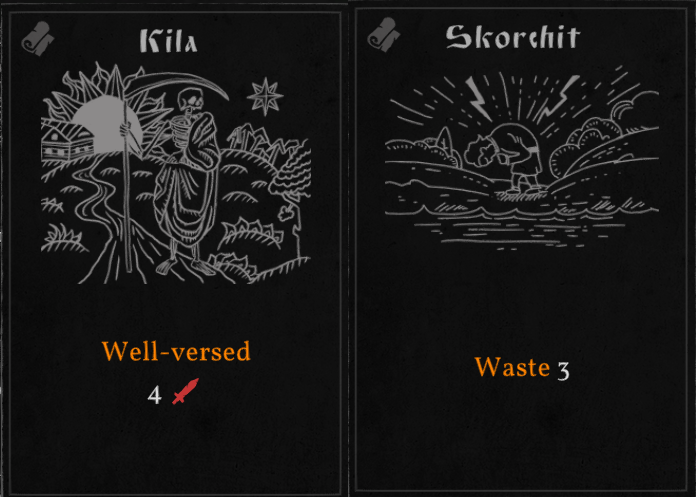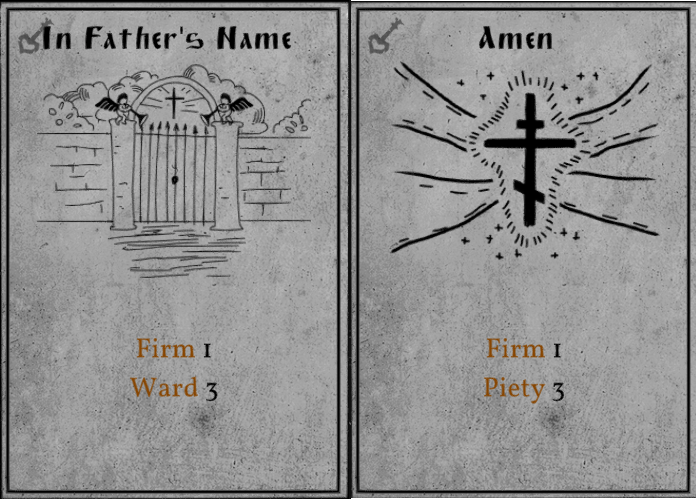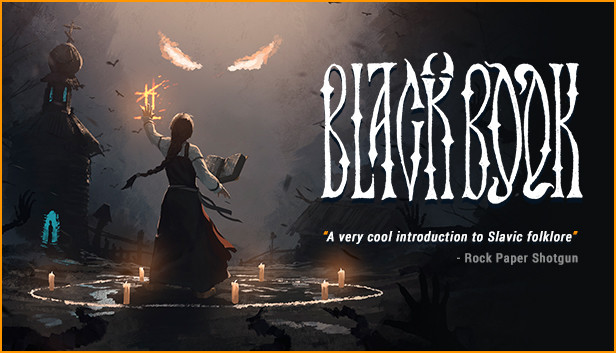This is intended as a basic, general guide on how to build a functional deck for Black Book, since it’s the most frequent thing I’ve been seeing people complain about. I’m aiming this guide at people who have little to no experience with deck-building games, so they have an idea of how to best use the pages they get.
1. A sentence is made out of Words.
Example 1: Kila and Skorchit
 Kila will, by itself, do 4 damage to a target. However, it also has the Well-Versed Word, which means it’s damage increases by 1 for every other Black Page in the same zagovor. Since it’s paired with another Black Page, Skorchit, it deals 5 damage (4 as the base plus 1 from the other Black Page in the zagovor).
Kila will, by itself, do 4 damage to a target. However, it also has the Well-Versed Word, which means it’s damage increases by 1 for every other Black Page in the same zagovor. Since it’s paired with another Black Page, Skorchit, it deals 5 damage (4 as the base plus 1 from the other Black Page in the zagovor).
Example 2: In Father’s Name and Amen
 This one’s a bit more complex. Amen gives you Piety which increases the shield value from a Page by 3 (meaning if you played, say Avdelai you’d gain 8 shields instead of 5). In Father’s Name, meanwhile, gives you Ward, which gives you 3 shields at the start of your turn. The thing is, Piety counts the shields you gain from Ward as well, which means that if you had both Pages active (either played in the same turn or lingering from a previous zagovor), you’d gain 6 shields at the start of your turn (3 from Ward and a bonus 3 from Piety).
This one’s a bit more complex. Amen gives you Piety which increases the shield value from a Page by 3 (meaning if you played, say Avdelai you’d gain 8 shields instead of 5). In Father’s Name, meanwhile, gives you Ward, which gives you 3 shields at the start of your turn. The thing is, Piety counts the shields you gain from Ward as well, which means that if you had both Pages active (either played in the same turn or lingering from a previous zagovor), you’d gain 6 shields at the start of your turn (3 from Ward and a bonus 3 from Piety).
2. Figure out what your Book’s about.
Do you want to set your enemies on fire and watch them burn as they try and fail to breach your defences?
Do you want to roll a snowball down a hill and watch it gain size until it crushes your enemy at the bottom?
Do you want to speak a sentence so powerful that it rattles around in your enemies heads and shreds their brain even after you’ve finished speaking?
Pick a theme and then start binding your Book to suit. If you try to get your Book to do too many things it ends up just being weak or mediocre at all of them, so you will need to specialize a bit, and potentially edit it on the road (which is where all those spare Pages will come in handy).
3. Is this a short story or a doorstopper?
A smaller Book means you can cycle through your Pages faster, so you can get to what you want the Book to do without having to wade through selections that don’t necessarily work with what you want to do. A larger Book, meanwhile, gives you more options to respond to different threats or ways around other creatures’ defences.
There’s no “right way” to go about it – you have to figure out what’s right for you. This is one of those things that comes with practice through trial and error, so don’t be afraid to have multiple saves so you can go back and reconfigure your Book if something’s not working.
On that note, however, you do want to have a large variety of Pages available to you to build your Book with – there’s nothing worse than getting to an important fight, figuring out the strategy you want to go with, and then discovering that your strategy relies on a Page you don’t have access to!
4. Proofreading
- Can I defend myself?
- Can I heal myself if I take damage?
- How much damage am I giving out?
- Do I have enough Pages to be able to do what needs doing?
- Is it going to take too long to get the Pages out that I need?
- Is my entire strategy reliant on a single Page? (this is bad)
- If I were trying to defeat someone using this Book configuration, how would I go about it?
Give your Book a thorough once-over and see how it needs changing. Sometimes you might not be able to do this until you’re actually in the field and working with it (which is when having all those extra Pages to choose from comes in handy).
5. Supplementary material
Always handy in a pinch to get you out of something you didn’t quite anticipate. If you’re using them all the time, however, that’s a sign that you haven’t got the best Book for your circumstances. Do some more proofreading, especially considering the enemies you’re facing, and maybe reload to earlier states if something’s really not working out for you.
While there are some later Pages with Words that interact with herbs you use (Burning Herbs inflicts damage to your enemies every time you use a herb, for example), it’s not something you want to build a Book around. Maybe have it as an emergency back-up strategy.
These can help give you a kick-start to some Book layouts (usually the ones that give you something on the first turn), with others providing a slight edge in something (maybe a couple of extra health, or a boost in healing, or a slight reduction in enemy damage). Every little bit helps, and you should mix and match your items to suit the Book you’re working with – what the “best” item is largely depends on what your Book has.
The Book Handling and Blackspeech sections will be the best ones to use – Book Handling lets you draw more Orders and Keys to work with and will give you more Pages in the long run; Blackspeech – particularly the Fierce Words and Help of Saints trees – will enhance the direct power of many of your Pages (but not all of them – Fierce Words won’t help with Waste or Curse, and Help of Saints doesn’t do anything to heal your wounds).
6. Co-writers
Levonty uses Waste, so he’s good if you need damage-over-time – moreso if you’ve done his quest and he can add Decompose on top of it. If you’ve got a Book built around Waste, Levonty is going to be incredibly handy.
Nikolay just deals damage. Simple and effective for a nice little (literal) kick if you need it. Note that his damage doesn’t interact with anything you have that enhances it (such as Bless).
Old Egor will Curse your enemies, reducing their damage output – handy for Books where you need to try and control how much damage your enemy deals out, if you’ve got Pages that deal damage based on the Curse status, or you’re working with a Book that hurts your enemies when they hurt you.
Proshka will give you some extra shields – which, interestingly enough, do interact with Piety and other shield-related effects. If you’ve bound your Book around gaining shields and effects that deal damage when you gain shields, Proshka will be incredibly useful.
Three Example Books
Black Orders: Skorchit (4), other damage-dealing Pages to taste
White Orders: Avoil (2), Salmanida (1-2), Varahail (2)
Black Keys: Koldun Fiend (1-2)
White Keys: Amen (1-2), Babushka-Serafimushka (1), In Father’s Name (1-2), Once and Forever (2)
Gear: Items that enhance Waste, Piety, or Ward; items that grant extra shields
Abilities: Help of Saints, Orders I/II, Keys I/II
Companions: Levonty or Old Egor
This Book is designed for someone who wants to set their enemies on fire, then sit back and watch as they burn to death and pound ineffectually against your defences. Skorchit is your main damage-dealing Page, while your defences are largely supported through a combination of Amen and In Father’s Name boosting what you get from Avoli and Once and Forever. Babushka-Serafimushka helps cycle through your Keys that little bit faster (and also healing any wounds that might slip through with Salmanida), while any extra direct damage that you might need to top enemies up with is covered with Koldun Fiend and a bit of help from Varahail.
The items you equip will either help boost your defences so they can’t hit you or set them on fire faster. Help of Saints boosts your White Pages, meaning you may be able to substitute other Pages in to replace them if you’re facing weaker enemies. Old Egor is handy to weaken your enemies so they don’t hurt you as much if they do happen to get through your defences, while Levonty will help set them on fire just that little bit faster (and more aggressively if you’ve got a boss to deal with).
Black Orders: Griya (4+)
White Orders: Avoil (1-2), George the Father (2), Salmanida (1-2), Varahail (4)
Black Keys: Koldun Fiend (1-2)
White Keys: Amen (2), Once and Forever (2)
Gear: Items that boost damage or grant extra shields.
Abilities: Fierce Words, Orders I/II, Keys I/II
Companions: Any
This Book is built around Griya – gradually escalating the amount of damage you’re doing with each attack until it can utterly crush your foes. Your White cards are all either providing some much needed protection (Amen, Avoil, Once and Forever), boosting your damage (George the Father) or both (Varahail). Any of the companions will work with this Book, but will do so in different ways – Proshka can give you emergency defences, Old Egor helps control your enemies’ damage output, Levonty adds some burn, and Nikolay can throw some extra punches. The longer you can stay alive, the more damage you’re going to do with your cards.
Black Orders: Kila (2), Nava (4)
White Orders: Varahail (2-4), Salmanida (1-2)
Black Keys: Firmer Than Stone (1-2), Koldun Fiend (1-2), Lock (2)
White Keys: Amen (1), Babushka-Serafimushka (1), Once and Forever (1)
Gear: Items that grant Eloquence (Black) or interact with Well-Versed or Firm; items that reduce enemy damage, increase your shields, or increase your health
Abilities: Fierce Words, Help of Saints, Keys I/II
Companions: Old Egor or Proshka
This is a damage-heavy Book where you are taking advantage of both Firm and Well-Versed – all of your Black Pages have one of those Words on them, with Nava having both, so you get not just immediate damage but lingering damage for the next zagovor. Pair it with the Bless you get from Varahail and your Pages and zagovors will be doing huge amounts of damage. You will, however, need to manage your defences carefully with this one, as a lot of your zagovor will be taken up with Black Pages – items that grant you extra support with your defences will be incredibly handy, since you won’t have much of a problem keeping the damage up. Old Egor or Proshka are your main two companion choices, since they’re going to be able to help a great deal with keeping enemy damage down (Old Egor moreso than Proshka).
Epilogue
Incidentally, you should be able to use the general guidelines I’ve written up here in other deck-building games as well. You’ll need to tune them a bit to how those particular games work, but it’s a starting point if you’re not very familiar with the style.
Thanks to Lofwyr for his great guide, all credit to his effort. you can also read the original guide from Steam Community. enjoy the game.

